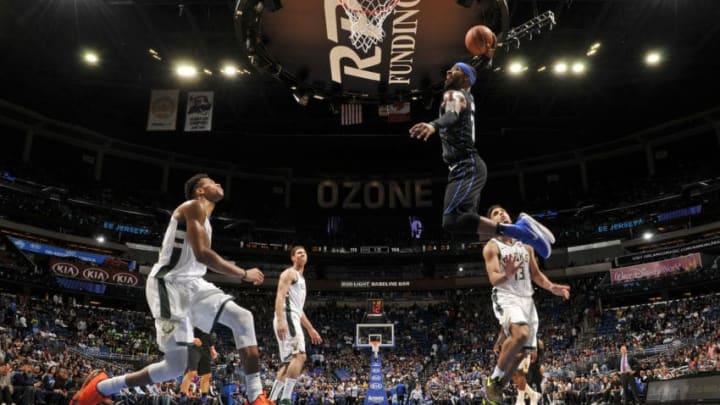
The Good and the Bad
| Season | G | MP | FG% | 3P% | eFG% | FT% | TRB | AST | STL | TOV | PTS |
|---|---|---|---|---|---|---|---|---|---|---|---|
| 2018-19 | 81 | 26.5 | .428 | .383 | .534 | .875 | 3.5 | 1.7 | 0.9 | 1.1 | 15.1 |
| Career | 492 | 24.3 | .423 | .374 | .521 | .819 | 2.8 | 1.1 | 0.8 | 0.9 | 10.5 |
Provided by Basketball-Reference.com: View Original Table
Generated 5/13/2019.
Terrence Ross is the kind of player where perception matters more than reality. That was even the case last year when he struggled to shoot through the first 20-plus games before the injury. Even when he is shooting in the low 30s from beyond the arc, he can still draw a lot of gravity.
The Magic do not have a lot of 3-point shooting, but Ross’ ability to shoot and make 3-pointers caught opponents’ attention. But quickly, Ross started to climb scouting reports because he was making 3-pointers at a higher rate.
Ross had one of the best 3-point shooting seasons of his career. And then turned it into the best scoring year of his career (15.1 points per game).
The Magic used him on pin downs, cuts and curls, springing him free and making him the centerpiece of the bench units. Orlando ran plays specifically to spring him free.
This served Ross best. He got the opportunity and took advantage of it, quickly entering the team’s finishing lineup since coach Steve Clifford believed he needed his best offensive lineup late in games.
There was no doubt that Ross gave the Magic a better chance offensively just for the floor spacing. But Ross also has the ability to rise up and shoot with virtually no space. Every little gap the defense gives him coming around screens is enough for him to get his shot off. He is such a quick trigger that he can rise up quickly.
That, with his high percentage, gave him the ultimate green light. He had the freedom to shoot almost every time he touched the ball — he had 12.7 field goal attempts per game to shoot 42.8 percent from the floor and posted a fairly robust 23.9 percent usage rate.
Usually, that inefficiency could drive anyone mad, but Ross made up for it because he would deliver in big moments. He was one of the Magic’s few tough-shot makers. If the Magic needed a seemingly impossible shot to go in and change the team’s momentum, Ross was the guy to deliver it.
Ross won plenty of games with his shot-making, just as he lost Orlando a few games with his poor shooting. He was not necessary to a win, but he really helped. Especially when key players were struggling. Ross would get his game going and the rest of the team would follow.
That was invaluable to the team. He literally had four or five moments where he changed the momentum fo the game and bailed the team out.
Defenses could not really figure out how to stop him consistently — until the playoffs when Norman Powell and the Toronto Raptors’ defense did a better job staying attached to his hip and making his shot attempts quickly.
